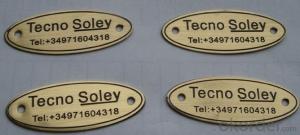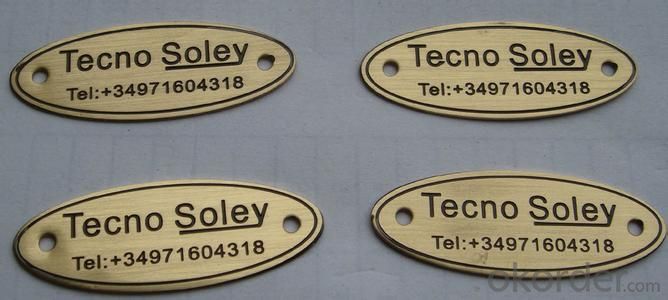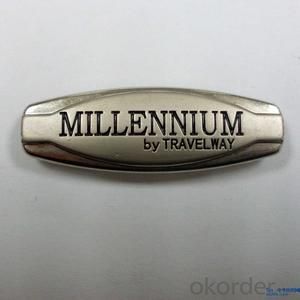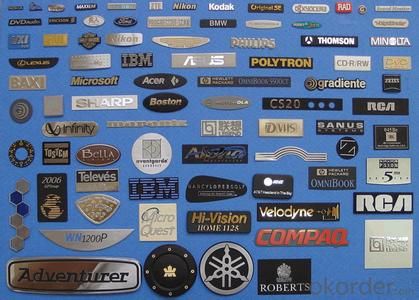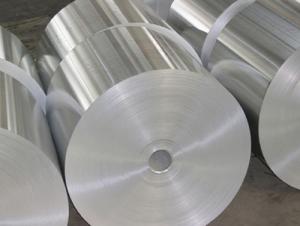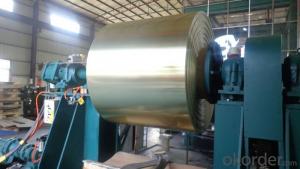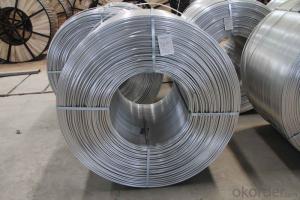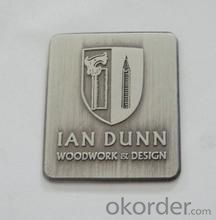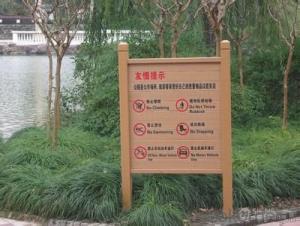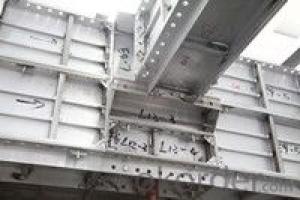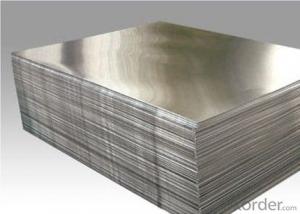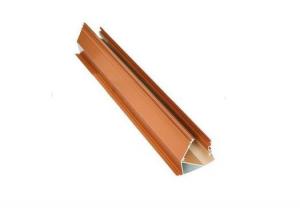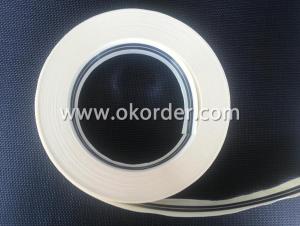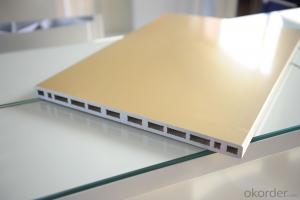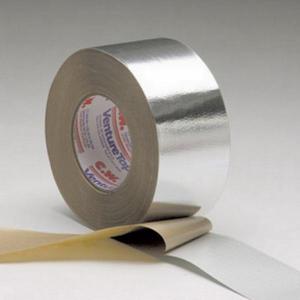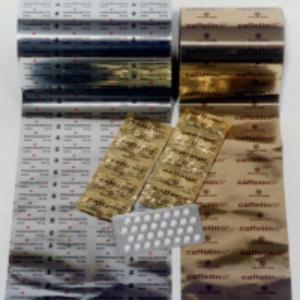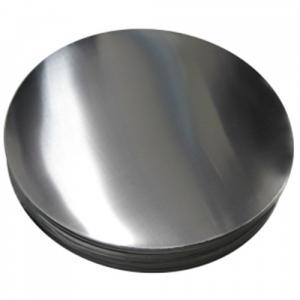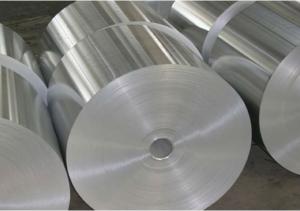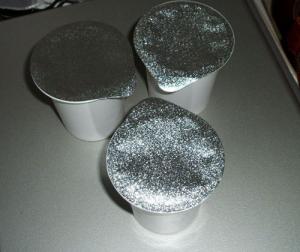Custom Aluminum Metal Name Plate
- Loading Port:
- China Main Port
- Payment Terms:
- TT or LC
- Min Order Qty:
- -
- Supply Capability:
- -
OKorder Service Pledge
OKorder Financial Service
You Might Also Like
Application:
Custom metal nameplate widely used for the following industry as a great customized, fashion & high quality accessory.
a. Garment industry: overcoat/jacket/suit/leisure suit/t-shirt/shirt/skirt/work-clothes/sports wear/jeans wear/trousers/pants and so on.
b. Bag industry: handbag/dust bag/school bag/purse/backpack/luggage and so on
Technique:
a. Custom metal nameplate electroplated in nickel free lead free metal color
b. Logo can be engrave/emboss/print or lasered
Quality contral:
a. 100% inspection before packing
b. Spot inspection before shipment
Packing details:
a. Standard seaworthy packing for long distance transportation;
b. 1 unit nameplate with a single poly bag;
b. 2,000pcs/ carton;
c. Size of carton: 60 x 30 x 26CM;
Shipment way:
a. DHL/Fedex/UPS/TNT by air for small orders, they will provide door to door service.
b. Suggest to settle the shipment by sea for mass production.
After-sale service:
a. Always provide our best after sell service for all oversea customers
b. Free replacement if find out any short or defective goods within 90days after shipment
Specifications
Custom metal product nameplate,scutcheon,logo label
1.High quality.
2.Competitive price.
3.Design per request.
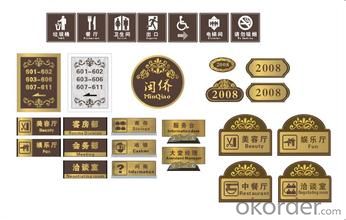
Advantage
1.Attractive with super quality.
2.Reasonable price in competitive quality.
3.Experienced technical staff.
4.Prompt delivery and satisfactory service.
Commodity:Warning sign | ||
Description | Material | Zinc alloy,copper,iron or customized |
Price | 0.1-1USD | |
Size | Customized | |
Design | Customized | |
Process | Casting,polishing,electroplating,painting | |
Color | Customized | |
Sample time | 7 days | |
Delivery time | 15 days | |
Payment Terms | T/T,Western Union | |
Packing | Details | 1 pc/opp bag or customizable |
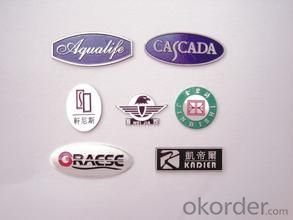
- Q: Explain how aluminum influences the propagation of sound waves.
- <p>Aluminum has a high density and stiffness, which makes it an effective conductor of sound. When sound waves hit an aluminum surface, the vibrations are quickly transmitted through the material due to its low internal damping. This results in a clear and efficient transfer of sound energy. However, aluminum's high reflectivity can also lead to a significant amount of sound being reflected rather than absorbed, which can affect the acoustics in a space, potentially causing echoes or reducing sound absorption. Additionally, aluminum's conductivity can lead to a faster decay of sound within the material, impacting the duration and quality of sound transmission.</p>
- Q: What precautions should be taken when handling or working with aluminum?
- <p>When working with aluminum, several safety measures should be taken: Wear appropriate personal protective equipment (PPE) such as gloves, safety glasses, and a dust mask to prevent inhalation of aluminum dust. Ensure proper ventilation to avoid the buildup of dust or fumes. Use tools and equipment designed for aluminum to prevent sparks or heat buildup, which can cause fires. Store aluminum in a dry place to prevent corrosion. Always follow the manufacturer's guidelines for handling and processing aluminum, and be aware of the specific hazards associated with the aluminum products you are working with.</p>
- Q: This question asks about the potential dangers associated with exposure to aluminum through consumption of food and drinking water.
- <p>Aluminum exposure in food and water can pose several health risks. Chronic exposure may lead to cognitive dysfunction and Alzheimer's disease, although this link is still debated. It can also cause bone disease by leaching calcium, potentially leading to osteomalacia and osteoporosis. In the nervous system, aluminum can cause neurotoxicity, leading to symptoms like memory loss and impaired learning. Additionally, aluminum may accumulate in the brain, potentially contributing to neurodegenerative conditions. It's important to note that the extent of these risks can vary based on individual susceptibility and the level of exposure.</p>
- Q: Is it possible to recycle aluminum at home?
- <p>Yes, aluminum can be recycled at home. It's easy to recycle as it's a lightweight, durable, and infinitely recyclable material. Simply clean and flatten aluminum cans, foil, and other aluminum products before placing them in your recycling bin. However, not all home recycling programs accept all types of aluminum, so check with your local recycling center for specific guidelines.</p>
- Q: Is it dangerous to consume food wrapped in aluminum foil due to the risk of aluminum poisoning?
- <p>There is minimal risk of aluminum poisoning from eating food wrapped in aluminum foil. Aluminum foil is designed to be food-safe and does not easily transfer aluminum to food under normal cooking conditions. However, at extremely high temperatures or when foil is used to cook acidic foods, there might be a slight increase in aluminum exposure. The body naturally excretes excess aluminum, and the small amounts typically ingested from food packaging are not considered harmful. Nonetheless, it's always a good idea to follow proper food handling and cooking practices to minimize any potential risks.</p>
- Q: Is it possible to recycle aluminum cans to create new ones?
- <p>Yes, old aluminum cans can be recycled to make new ones. The recycling process for aluminum is highly efficient and environmentally friendly. Aluminum cans are collected, sorted, and then shredded into small pieces. These pieces are melted down in a furnace, and the molten aluminum is poured into molds to create new cans. This process uses only 5% of the energy required to produce aluminum from raw materials, making it a sustainable and cost-effective method of production.</p>
- Q: This question asks for innovative applications of recycled aluminum in various industries or everyday life.
- <p>Recycled aluminum is finding new uses in various sectors due to its sustainability and strength. It's being used in the automotive industry to make lighter vehicles, reducing fuel consumption and emissions. In construction, it's used for building materials like window frames and roofing, known for durability and energy efficiency. Recycled aluminum is also employed in the aerospace industry for aircraft parts due to its lightweight and high strength-to-weight ratio. Additionally, it's used in packaging, reducing waste and conserving resources. In electronics, recycled aluminum is used in the manufacturing of various components, contributing to the circular economy.</p>
- Q: Is aluminum a suitable material for constructing aerospace structures?
- <p>Yes, aluminum is widely used in aerospace structures due to its high strength-to-weight ratio, corrosion resistance, and ease of fabrication. It is particularly favored for aircraft frames, wings, and fuselage components. Aluminum alloys are also used in spacecraft and satellite structures for their lightweight properties and ability to withstand extreme temperatures.</p>
- Q: Explain the relationship between aluminum and electrum, if any.
- <p>Aluminum and electrum are two distinct metals with no direct relationship. Aluminum is a lightweight, silvery-white metal that is the most abundant metallic element in the Earth's crust. It is known for its corrosion resistance and is widely used in various industries. Electrum, on the other hand, is a naturally occurring alloy of gold and silver, valued for its unique properties and historical significance. While both metals are used in various applications, they are chemically and physically different and do not have a direct connection.</p>
- Q: Explain the different methods used for recycling aluminum.
- <p>Aluminum recycling methods primarily include mechanical recycling and re-melting. Mechanical recycling involves cleaning, shredding, and sorting aluminum waste before reprocessing it into new products. Re-melting involves melting aluminum scrap and then casting it into new aluminum products. This process is energy-efficient, as it requires only 5% of the energy needed to produce aluminum from raw materials. Additionally, aluminum can be recycled indefinitely without losing its properties, making it one of the most recyclable materials.</p>
Send your message to us
Custom Aluminum Metal Name Plate
- Loading Port:
- China Main Port
- Payment Terms:
- TT or LC
- Min Order Qty:
- -
- Supply Capability:
- -
OKorder Service Pledge
OKorder Financial Service
Similar products
Hot products
Hot Searches
Related keywords
